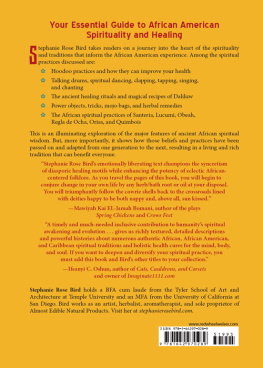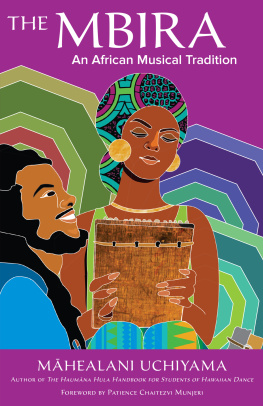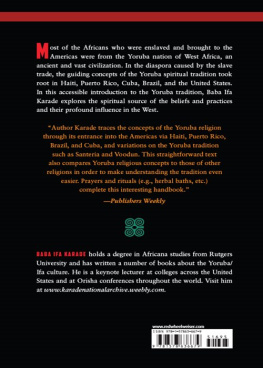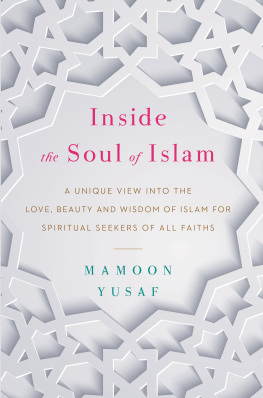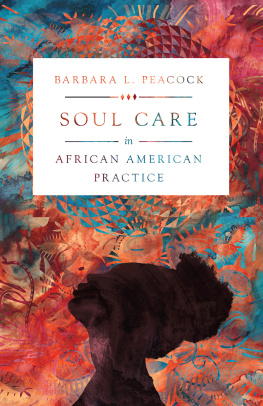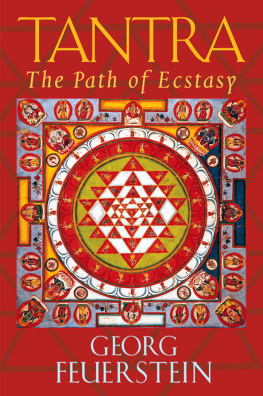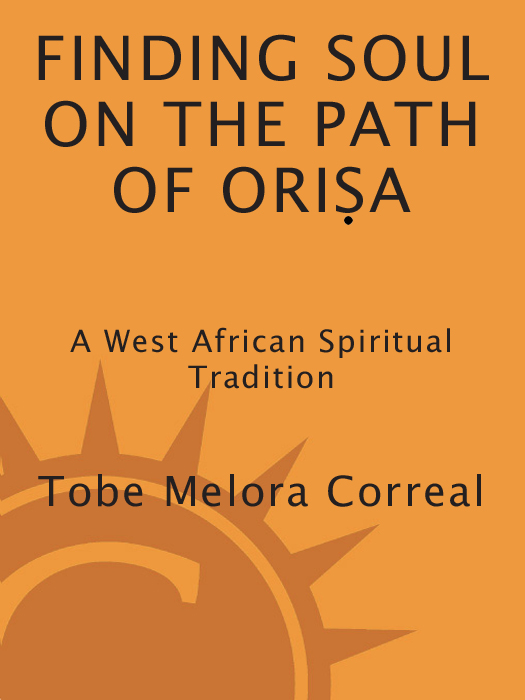
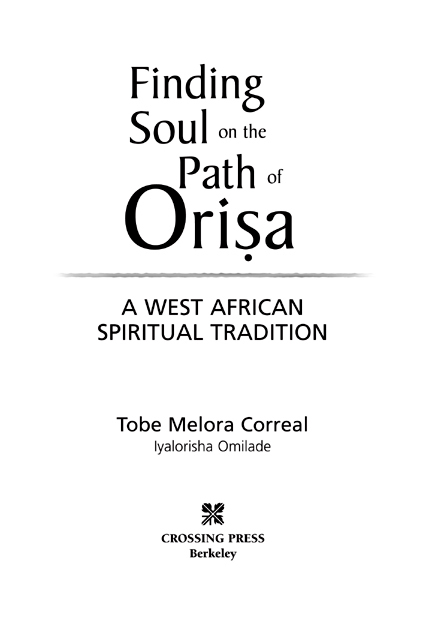
Text copyright 2003 by Tobe Melora Correal
All rights reserved. Published in the United States by Crossing Press, an imprint of the Crown Publishing Group, a division of Random House, Inc., New York.
www.crownpublishing.com
www.tenspeed.com
Crossing Press and the Crossing Press colophon are registered trademarks of Random House, Inc.
Library of Congress Cataloging-in-Publication Data
Correal, Tobe Melora.
Finding soul on the path of Orisa : a West African spiritual tradition / by Tobe Melora Correal.
p. cm.
Includes bibliographical references.
1. Yoruba (African people)Religion. 2. Orishas. I. Title.
BL2480.Y6 C665 2002
299.68333dc21
2001042253
eISBN: 978-0-307-81609-2
v3.1_r1
Dedication

For Sunshine Akanella, for being willing to get well and for making this book possible.
And for my amazing and delightful nieces, Zoe, Amara, and Nia Bleu:
May life give them everything they need
To grow into self-actualized, self-loving, brave-hearted women.
Contents
Acknowledgments
Sadly, I have far less room than I need to publicly thank all the individuals who have supported this book in some way. That said, I am deeply grateful to:
My precious mom, Vega Melissa Correal, Obatalas daughter. Her support for this book and encouragement of my many creative passions have been unshakable. Adupe, mama.
My ancestors and the Orisa, who bring me healing and beauty beyond measure, for so patiently teaching me about the true nature of their love.
My Godmother, Gladys Bobi Cespedes-Obalade, santera and spiritualist extraordinaire, who lined my spiritual pockets with plush velvet, then filled them with diamonds and gold. I could ask for no better foundation than the one she gave me.
My Godfather Cyril Skip Butler-Omitolokun, for his tender loving care and for being such a shining example of Yemayas strength and goodness.
Yvette Cortez-Eyeleti, my former wife and partner, who was at my side almost from the beginning of this project. Through numerous rejection letters, the tedious and frustrating hunt for a publisher, endless rewrites, and last minute crises, she supported, sustained, and loved me. I could not have done this without you. Gracias pa todo.
My editor at Crossing Press, Colleen Sell, for caring for my book as if it were her own; Brie Mazurek, my editor at Ten Speed Press, for having such a clear ear; Silver Tyler, formerly of the Ann Rittenberg Literary Agency, for seeing the jewel beneath the very rough edges of this projects early stages; and the Serpent Source Foundation for Women Artists, for awarding me a generous grant at a critical time in my writing.
My peeps, Amara, Frances, Birrell, Donna, Liz, and Bishop; and asha bandele, Tara Hunter, Nancy Brady Cunningham, Sim-El Fatunmishe, and Richelle, for facilitating connections.
Aya de Leon, who holds the vision of whats coming when I am unable to, for witnessing me with so much love, and for nonstop encouragement and excellent ideas.
My therapist, Catherine Tahmin, a woman of exceptional heart and wisdom, for being a channel for Orisas renewal, and for giving me such a strong and compassionate container in which to grieve, rage, and heal.
Saidiya Hartman, an amazing writer and dearest friend, for being at my side when I took my first terrified steps toward writing this book. Her tender care kept me afloat during rough waters. Time and again, she insisted I had the right to write and reminded me that though the road is long it is never futile.
The fantastic and honey-licious Gina Gold, for helping me get through what felt like an endless abyss of dreary days, for feeding me daily doses of encouragement along with her ferocious and brilliant humor, for making sure I stay honest, for loving me even when I mess up, and for mad fun in New York City. Bow down!
Prologue
The Yoruba religion is the science of allowing God to flow through you, so that each breath becomes a prayer, and as God breathes, you breathe.
John Mason
I was in my early twenties when I first discovered these words. In those early years of my spiritual development, they were like gold for me. With a simple, clarifying grace, they spoke to my deepest yearning for a life of reverence and bore the promise of blessings I knew the tradition held.
Yet, I was full of questions. How do I let God flow through me? What if I dont like the feel of Gods breath in me? If Im angry or sad, are those breaths still prayers, still God? Though Masons words resonated with me, I had no idea how to apply his teachings to my daily life. I had found a spiritual path that beckoned me, but I had no map or compass to guide my journey.
My first spiritual guidance came from my mother. Though she never took my brother and me to church or espoused a particular religion or spiritual doctrine, she taught us that God lives in all things, especially in nature. One of my sweetest childhood memories is of my mom pointing out the wonder of a blossoming tree as we walked together one spring afternoon and saying to the tree, Look how special you are! Thank you for being so beautiful.
My mothers hunger for spiritual knowledge and her constant struggle to find and stay connected with an accessible, generous Divine Presence were a prevailing influence throughout my childhood. She studied metaphysics and the Tarot, her favorite being the Death card, which says death paves the way for new life. One of her favorite deities was the Hindu goddess Kali, who transforms via annihilation. Her fascination with rebirth through death would later deeply affect my own spiritual work.
When we were growing up, mama also kept altars, which were made of simple, carefully selected and placed representations of Divinity: shells, candles, rocks found in sacred places, a special swatch of cloth, a prayer handwritten on pretty paper. My moms reverence for the natural world and for creativity had a profound and lasting impact on how I would worship as an adult.
Although my mothers emotional anguish often distracted her from her childrens needs, she encouraged my intuitive nature in small but significant ways. When I told her Id seen a man standing in the air, she acknowledged Id seen a spirit and asked me to describe him. When I confided my fear of a group of bullies at the bus stop, she taught me how to make myself invisible and how to move danger away from me. She told me that intention was the essence of magic. She also admonished me to do to others only what I would want to come back to mebecause come back it would, three times over. Shortly after my graduation from high school, my mom took me to a ritual led by one of her coworkers, a voluptuous and kindhearted Wiccan priestess. That small gathering honoring the ancestors sparked the beginning of my conscious intention to pursue an Earth-centered spiritual life. But my mothers Wicca friend soon moved to Great Britain, and I didnt know how to find the spiritual guidance I craved. So I continued to feel called to a spiritual life and yet adrift at the same time.
Then I began taking African dance. Near the studio was a botanica, a store for practitioners of Orisa tradition, then most widely known in the United States as Santeria. One afternoon on my way home from class, I stopped in to browse. A feeling of familiarity, of home, filled me. The books and artifacts spoke of God in nature, of spirits and ritual, of altars and magic. From that day forward, I read everything I could find about Orisa and soon discovered John Mason.
Next page

